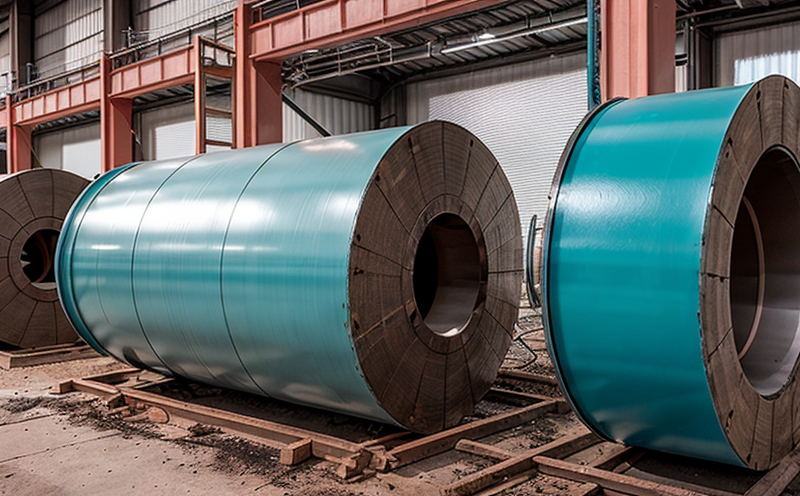ISO 21010 Hydrogen Embrittlement Testing
The ISO 21010 standard is pivotal in assessing the resistance of materials to hydrogen embrittlement, a critical concern for industrial manufacturing and processing. This testing method evaluates how susceptible metallic materials are to cracking under stress when exposed to hydrogen environments. Understanding this property is essential for ensuring material integrity, especially in sectors where components operate under high-stress conditions.
The process involves subjecting specimens to various stresses while simultaneously exposing them to hydrogen gas or a hydrogen-rich environment. This exposure simulates real-world operating conditions that can lead to embrittlement. The test measures the material's resistance by observing any changes in its mechanical properties, particularly the fracture toughness and tensile strength.
Hydrogen embrittlement is particularly pronounced in high-strength steel alloys used extensively in industries such as automotive, aerospace, and energy generation. Accurate testing helps manufacturers identify materials that are prone to failure under operational conditions, thereby enabling them to select more durable alternatives or implement protective treatments like coatings.
During the test, specimens undergo a series of mechanical loading cycles while immersed in hydrogen gas or electrolyte solutions. The stress level and duration can be adjusted based on specific application requirements. After exposure, the samples are examined using visual inspection or advanced imaging techniques to identify any cracks or other signs of embrittlement.
Key factors influencing test outcomes include the type of material being tested, the hydrogen source and concentration, temperature conditions during exposure, and the specific loading protocol used. Each factor can significantly impact the results, making it crucial for laboratories conducting this testing to adhere strictly to ISO 21010 guidelines.
The standard provides detailed procedures on how to prepare specimens, control environmental parameters, and perform post-test analysis. It also specifies acceptance criteria that determine whether a material passes or fails based on predefined thresholds of embrittlement.
Applied Standards
The ISO 21010 standard is widely recognized as the benchmark for hydrogen embrittlement testing across various industries. Beyond this, it aligns with other relevant international standards such as ASTM E1478 and EN 16519, which offer supplementary guidance on related testing methodologies.
- ISO 21010:2013 - Metallic materials -- Testing of the hydrogen-induced cracking resistance of fasteners
- ASTM E1478:2019 - Standard practice for determination of susceptibility to hydrogen embrittlement by cyclic loading in air and in hydrogen containing atmospheres
- EN 16519:2013 - Metallic materials -- Determination of the resistance to hydrogen-induced cracking under static load at room temperature
These standards collectively provide a comprehensive framework for ensuring accurate and consistent testing results, which is vital for maintaining high-quality manufacturing processes.
Eurolab Advantages
Eurolab offers unparalleled expertise in ISO 21010 hydrogen embrittlement testing. Our team of seasoned professionals ensures that every test adheres meticulously to international standards, delivering reliable and reproducible results.
- Comprehensive Testing Capabilities: We provide a full range of tests tailored to your specific needs, ensuring comprehensive evaluation of material properties.
- State-of-the-Art Facilities: Equipped with advanced instrumentation and equipment, our laboratories maintain ISO 9001 accreditation for quality assurance.
- Experienced Staff: Our team consists of highly skilled engineers and technicians who are trained to handle complex tests accurately.
- Robust Reporting: We offer detailed reports that include all relevant data and interpretations, aiding in informed decision-making processes.
By leveraging Eurolab's advanced capabilities, you gain access to industry-leading testing services that enhance the reliability of your materials and products.
Customer Impact and Satisfaction
- Improved Product Quality: Ensures that components are less likely to fail under operational conditions, enhancing overall product reliability.
- Enhanced Safety Standards: By identifying materials susceptible to hydrogen embrittlement early in the development process, potential risks are mitigated, contributing to safer end products.
- Cost Efficiency: Early detection of problematic materials through testing can prevent costly rework and redesigns later in the production cycle.
- Prompt Compliance: Our thorough testing processes help ensure compliance with regulatory requirements, reducing the risk of non-compliance penalties.





